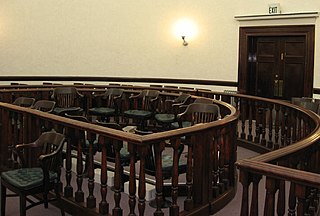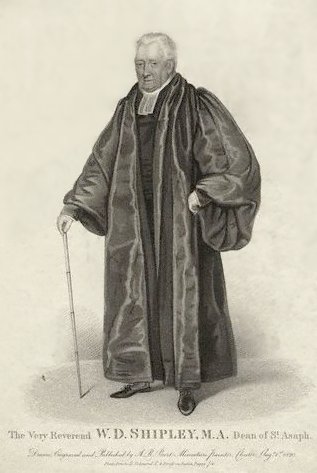In United States law, an Alford plea, also called a Kennedy plea in West Virginia, an Alford guilty plea, and the Alford doctrine, is a guilty plea in criminal court, whereby a defendant in a criminal case does not admit to the criminal act and asserts innocence, but accepts imposition of a sentence. This plea is allowed even if the evidence to be presented by the prosecution would be likely to persuade a judge or jury to find the defendant guilty beyond a reasonable doubt. This can be caused by circumstantial evidence and testimony favoring the prosecution, and difficulty finding evidence and witnesses that would aid the defense.
The adversarial system or adversary system or accusatorial system or accusatory system is a legal system used in the common law countries where two advocates represent their parties' case or position before an impartial person or group of people, usually a judge or jury, who attempt to determine the truth and pass judgment accordingly. It is in contrast to the inquisitorial system used in some civil law systems where a judge investigates the case.
A grand jury is a jury empowered by law to conduct legal proceedings, investigate potential criminal conduct, and determine whether criminal charges should be brought. A grand jury may subpoena physical evidence or a person to testify. A grand jury is separate from the courts, which do not preside over its functioning.

A jury trial, or trial by jury, is a legal proceeding in which a jury makes a decision or findings of fact. It is distinguished from a bench trial, in which a judge or panel of judges makes all decisions.
A plea bargain, also known as a plea agreement or plea deal, is a legal arrangement in criminal law where the defendant agrees to plead guilty or no contest to a charge in exchange for concessions from the prosecutor. These concessions can include a reduction in the severity of the charges, the dismissal of some charges, or a more lenient sentencing recommendation. Plea bargaining serves as a mechanism to expedite the resolution of criminal cases, allowing both the prosecution and the defense to avoid the time, expense, and uncertainty of a trial. It is a prevalent practice in the United States, where it resolves the vast majority of criminal cases, and has been adopted in various forms in other legal systems worldwide.
In law, a plea is a defendant's response to a criminal charge. A defendant may plead guilty or not guilty. Depending on jurisdiction, additional pleas may be available, including nolo contendere, no case to answer, or an Alford plea.

A jury is a sworn body of people (jurors) convened to hear evidence, make findings of fact, and render an impartial verdict officially submitted to them by a court, or to set a penalty or judgment. Most trial juries are "petit juries", and usually consist of twelve people. A larger jury known as a grand jury has been used to investigate potential crimes and render indictments against suspects.
Gideon v. Wainwright, 372 U.S. 335 (1963), was a landmark U.S. Supreme Court decision in which the Court ruled that the Sixth Amendment of the U.S. Constitution requires U.S. states to provide attorneys to criminal defendants who are unable to afford their own. The case extended the right to counsel, which had been found under the Fifth and Sixth Amendments to impose requirements on the federal government, by imposing those requirements upon the states as well.

A fine or mulct is a penalty of money that a court of law or other authority decides has to be paid as punishment for a crime or other offense. The amount of a fine can be determined case by case, but it is often announced in advance.

Criminal justice is the delivery of justice to those who have been accused of committing crimes. The criminal justice system is a series of government agencies and institutions. Goals include the rehabilitation of offenders, preventing other crimes, and moral support for victims. The primary institutions of the criminal justice system are the police, prosecution and defense lawyers, the courts and the prisons system.

Sir William Blackstone was an English jurist, justice and Tory politician most noted for his Commentaries on the Laws of England, which became the best-known description of the doctrines of the English common law. Born into a middle-class family in London, Blackstone was educated at Charterhouse School before matriculating at Pembroke College, Oxford, in 1738. After switching to and completing a Bachelor of Civil Law degree, he was made a fellow of All Souls College, Oxford, on 2 November 1743, admitted to Middle Temple, and called to the Bar there in 1746. Following a slow start to his career as a barrister, Blackstone became heavily involved in university administration, becoming accountant, treasurer and bursar on 28 November 1746 and Senior Bursar in 1750. Blackstone is considered responsible for completing the Codrington Library and Warton Building, and simplifying the complex accounting system used by the college. On 3 July 1753 he formally gave up his practice as a barrister and instead embarked on a series of lectures on English law, the first of their kind. These were massively successful, earning him a total of £453, and led to the publication of An Analysis of the Laws of England in 1756, which repeatedly sold out and was used to preface his later works.
Legal formalism is both a descriptive and normative theory of how judges should decide cases. In its descriptive sense, formalists maintain that judges reach their decisions by applying uncontroversial principles to the facts; formalists believe that there is an underlying logic to the many legal principles that may be applied in different cases. These principles, they claim, are straightforward and can be readily discovered by anyone with some legal expertise. Supreme Court Justice Oliver Wendell Holmes Jr., by contrast, believed that "The life of the law has not been logic: it has been experience". The formalist era is generally viewed as having existed from the 1870s to the 1920s, but some scholars deny that legal formalism ever existed in practice.
Discretion has the meaning of acting on one's own authority and judgment. In law, discretion as to legal rulings, such as whether evidence is excluded at a trial, may be exercised by a judge.
Legal proceeding is an activity that seeks to invoke the power of a tribunal in order to enforce a law. Although the term may be defined more broadly or more narrowly as circumstances require, it has been noted that "[t]he term legal proceedings includes proceedings brought by or at the instigation of a public authority, and an appeal against the decision of a court or tribunal". Legal proceedings are generally characterized by an orderly process in which participants or their representatives are able to present evidence in support of their claims, and to argue in favor of particular interpretations of the law, after which a judge, jury, or other trier of fact makes a determination of the factual and legal issues.
Plea bargaining in the United States is very common; the vast majority of criminal cases in the United States are settled by plea bargain rather than by a jury trial. They have also been increasing in frequency—they rose from 84% of federal cases in 1984 to 94% by 2001. Plea bargains are subject to the approval of the court, and different States and jurisdictions have different rules. Game theory has been used to analyze the plea bargaining decision.
A citizen's right to a trial by jury is a central feature of the United States Constitution. It is considered a fundamental principle of the American legal system.
Overcharging, in law, refers to a prosecutorial practice that involves "tacking on" additional charges that the prosecutor knows he cannot prove. It is used to put the prosecutor in a better plea bargaining position. The term has been defined in different ways. Alschuler writes that "to prosecutors, overcharging is accusing the defendant of a crime of which he is clearly innocent to induce a plea to the 'proper' crime. Defense counsel identify two types of overcharging. 'Horizontal' overcharging is the unreasonable multiplying of accusations against a single defendant. He may be either charged with a separate offense for every technical criminal transaction in which he participated, or the prosecutor may fragment a single criminal transaction into numerous component offenses. 'Vertical' overcharging is charging a single offense at a higher level than the circumstances of the case seem to warrant." Vertical overcharging is deemed to be the more abusive of the two practices. In defense of overcharging, it has been argued that in order to obtain a plea bargain that results in a lower sentence than the prosecutor's original position, while still obtaining a penalty that promotes public safety, the prosecutor must select an initial charge higher than is penologically appropriate.

The Case of the Dean of St Asaph, formally R v Shipley, was the 1784 trial of William Davies Shipley, the Dean of St Asaph, for seditious libel. In the aftermath of the American War of Independence, electoral reform had become a substantial issue, and William Pitt the Younger attempted to bring a Bill before Parliament to reform the electoral system. In its support Shipley republished a pamphlet written by his brother-in-law, Sir William Jones, which noted the defects of the existing system and argued in support of Pitt's reforms. Thomas FitzMaurice, the brother of British Prime Minister Earl of Shelburne, reacted by indicting Shipley for seditious libel, a criminal offence which acted as "the government's chief weapon against criticism", since merely publishing something that an individual judge interpreted as libel was enough for a conviction; a jury was prohibited from deciding whether the material was actually libellous. The law was widely seen as unfair, and a Society for Constitutional Information was formed to pay Shipley's legal fees. With financial backing from the society Shipley was able to secure the services of Thomas Erskine KC as his barrister.
A presumption of guilt is any presumption within the criminal justice system that a person is guilty of a crime, for example a presumption that a suspect is guilty unless or until proven to be innocent. Such a presumption may legitimately arise from a rule of law or a procedural rule of the court or other adjudicating body which determines how the facts in the case are to be proved, and may be either rebuttable or irrebuttable. An irrebuttable presumption of fact may not be challenged by the defense, and the presumed fact is taken as having been proved. A rebuttable presumption shifts the burden of proof onto the defense, who must collect and present evidence to prove the suspect's innocence, in order to obtain acquittal.
Lafler v. Cooper, 566 U.S. 156 (2012), was a United States Supreme Court case in which the Court clarified the Sixth Amendment standard for reversing convictions due to ineffective assistance of counsel during plea bargaining. The Court ruled that when a lawyer's ineffective assistance leads to the rejection of a plea agreement, a defendant is entitled to relief if the outcome of the plea process would have been different with competent advice. In such cases, the Court ruled that the Sixth Amendment requires the trial judge to exercise discretion to determine an appropriate remedy.






